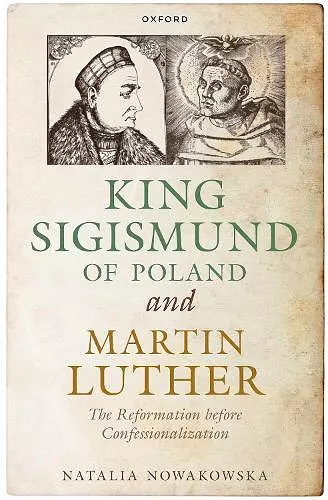King Sigismund of Poland and Martin Luther
The Reformation before Confessionalization
Format:Paperback
Publisher:Oxford University Press
Published:15th Jun '23
Currently unavailable, and unfortunately no date known when it will be back
This paperback is available in another edition too:
- Hardback£105.00(9780198813453)

The first major study of the early Reformation and the Polish monarchy for over a century, this volume asks why Crown and church in the reign of King Sigismund I (1506-1548) did not persecute Lutherans. It offers a new narrative of Luther's dramatic impact on this monarchy – which saw violent urban Reformations and the creation of Christendom's first Lutheran principality by 1525 – placing these events in their comparative European context. King Sigismund's realm appears to offer a major example of sixteenth-century religious toleration: the king tacitly allowed his Hanseatic ports to enact local Reformations, enjoyed excellent relations with his Lutheran vassal duke in Prussia, allied with pro-Luther princes across Europe, and declined to enforce his own heresy edicts. Polish church courts allowed dozens of suspected Lutherans to walk free. Examining these episodes in turn, this study does not treat toleration purely as the product of political calculation or pragmatism. Instead, through close analysis of language, it reconstructs the underlying cultural beliefs about religion and church (ecclesiology) held by the king, bishops, courtiers, literati, and clergy – asking what, at heart, did these elites understood 'Lutheranism' and 'catholicism' to be? It argues that the ruling elites of the Polish monarchy did not persecute Lutheranism because they did not perceive it as a dangerous Other – but as a variant form of catholic Christianity within an already variegated late medieval church, where social unity was much more important than doctrinal differences between Christians. Building on John Bossy and borrowing from J.G.A. Pocock, it proposes a broader hypothesis on the Reformation as a shift in the languages and concept of orthodoxy.
a truly path-breaking work. It is based on a command of a large primary and secondary printed and manuscript literature. It will be a must read for specialists in the history of the early modern Commonwealth, and, most welcome – I can't stress this enough – for important, serious scholars of the Reformation and the Counter-Reformation * David Frick, Sehepunkte *
With a wide range of sophisticated tools, including both the careful exploration of individual texts and a very insightful discursive analysis of a whole corpus of sixteenth century documents, Nowakowska has transformed our understanding of the Reformation in Eastern Europe (and beyond). * Comments from the judges of the 2019 Kulczycki Book Prize *
Natalia Nowakowska's book reshapes fundamental historical paradigms about the geographic parameters of the Protestant Reformation and the chronology of the Reformation in Poland ... In her marvelously vivid account of Lutheran political movements on Polish territory, Nowakowska captures the complexity of early sixteenth-century church-state relations and fluidly integrates the religious history of the Polish Republic into wider European trends, portraying it as a key example of how Protestantism dramatically ruptured worldviews across the continent. * Comments from the judges of the 2019 Reginald Zelnik Book Prize *
This monograph by Natalia Nowakowska fills an important gap in the research on the Reformation in Poland. This excellent study will serve as a credible interpretation and a handbook not only for students, but also for the broader public * Maciej Ptaszynski, Uniwersytet Warszawski, Renaissance Quarterly *
[an] excellent monograph ... [it] makes important contributions to the history of religious toleration, Reformation scholarship and research on Central Europe more broadly. It introduces a new way of thinking about toleration in the first half of the sixteenth century * Martin Christ, History *
Nowakowska's research now provides a detailed case study tracing how this played out in the lands of the Polish monarchy. It further convincingly pinpoints the fundamental shift, not merely to a narrowing down of options, but to the changing discourse about doctrine initiated by Luther ... The implications of the hypothesis are far-reaching ... This book shows how important the study of Central and Eastern Europe is to the history of the Reformation. As the first monograph on the subject for over a century it brings the Polish material back into view and into contact with the core scholarship. On a higher level it prompts us to think not only about the catalysts for historical change, but also about how people lived through, experienced and recognized great historical changes as they happened. * Suzanna Ivanic, European History Quarterly *
- Winner of Winner, George Blazyca Prize, British Association for Slavonic and East European Studies Winner, Gerald Strauss Prize, the Sixteenth Century Society Joint Winner, 2019 Kulcycki Book Prize in Polish Studies Co-winner, BASEES Women's Forum Book Prize Honorable Mention, 2019 Reginald Zelnik Book Prize in History Shortlisted, Pro Historia Polonorum Prize for the best book in Polish history.
ISBN: 9780198889434
Dimensions: 234mm x 157mm x 17mm
Weight: 450g
304 pages